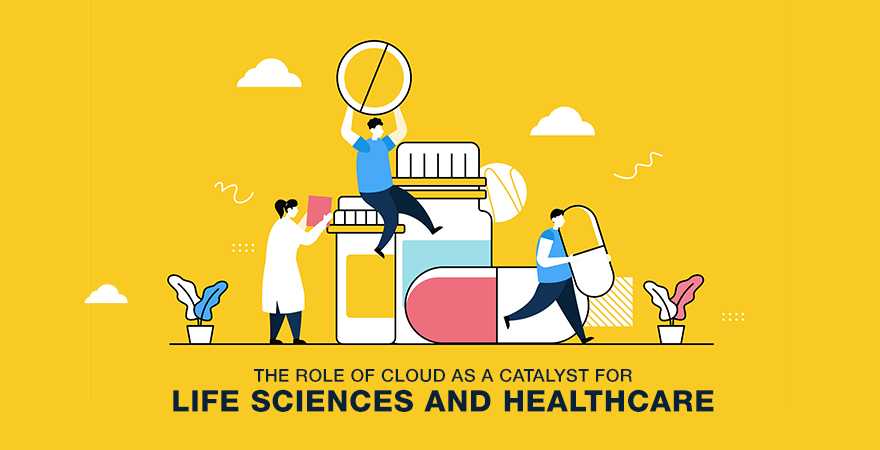Cloud Computing offers a wide range of advantages for the life sciences industry. The term life sciences incorporates a large number of sub domains such as biotechnology, medicinal research, pharmaceuticals, healthcare and much more.

The common denominator among all these intertwined areas is improving the quality of human life. However, all the above sub domains of life sciences are very capital intensive and require years or decades of constant Research and Development (R&D).
Read More: How Covid-19 is Reshaping Healthcare Technologies?
In this post, we will discuss how cloud based solutions have the potential to become a game changer for the life sciences industry in general and healthcare initiatives in particular.
Biotechnology and Cloud
The field of biotechnology is highly data centric. It is all about studying the intricate correlation between various living organisms and integrating them into a living entity that can potentially benefit man in ways never imagined before.
If we analyze the data processing capability of any individual biotech research firm that solely relies on its in house infrastructure, it will soon hit a wall due to the limitations on how much data it can handle and articulate.
This is where the cloud comes in with its nearly limitless computing power and the ability to house big data. Many innovative biotech solutions of the future will be carved by leveraging the sheer processing muscle of the cloud.
Also Read: 10 Tips to Support Remote Workforce Amid Covid-19
Cloud and New Drug Research
We are often being confronted with novel diseases or viruses. These are the result of constant mutation and the damage we have inflicted on mother nature in achieving this heightened level of technological advancement.
At the end of day, nearly all medicinal research boils down to chemistry and multi tier modeling of various possible alternatives. Presently, drug research firms are confronted with the challenge of rapidly shrinking the medicine discovery cycle.
This is partly due to the fact that any novel disease has the potential to morph into a full blown pandemic of global proportions. The recent case of the novel Corona Virus aka Covid-19 is a classic example.
In order to shrink the drug discovery cycle, drug companies need access to vast amounts of historical data of patients and already established medicinal remedies. In addition to housing such a vast amount of data, you also need processing capabilities.
This sort of capability of both handling and processing vast volumes of data inherently resides in the cloud, waiting to be tapped. By utilizing the immense potential of the cloud, we can remarkably reduce a new drug’s rollout cycle and save precious lives.
Also Read: Cloud Computing; A Savior Among the Covid-19 Crisis
Healthcare and Telemedicine
The healthcare sector is heavily strained even in the developed economies of the world, what to talk of resource impaired developing economies. Health care budgets are touching billions of dollars annually and showing no signs of respite.
By taking most elements of healthcare to the cloud, we can bring efficiency, ease and cost cutting to this sector as a whole. Telemedicine platforms can be made cloud native so that a single physician or consultant can cater to a larger and wider patient base.
Cloud powered telemedicine platforms will truly make healthcare a globally accessible facility. A consultant in the U.K would be able to render reliable medical advice to a patient residing in Africa, at a fraction of the cost that would have incurred otherwise.
Medical Data, Records and Cloud Security
Perhaps the single most notable factor that has impeded the growth and proliferation of cloud powered healthcare initiatives is concerns around cloud security. The viability and success of most of the above healthcare services relies on data.
This involves moving highly sensitive and personal medical records of millions or even billions of patients over the cloud. This data would then serve the dual purposes of performing R&D as well as delivering healthcare over the cloud where possible.
Also Read: Covid-19: A Catalyst for Desktop as a Service (DaaS) Demand
Cloud security is without doubt a critical issue in healthcare. Some of these concerns can be allayed by introducing more stringent standards for those Cloud Service Providers (CSP) which handle sensitive medical records in any way.
Conclusion
We are at a turning point when it comes to healthcare in particular and life sciences in general. What we need to do is embrace the cloud in a whole hearted manner, without compromising on data security. We can take human health to new heights.


